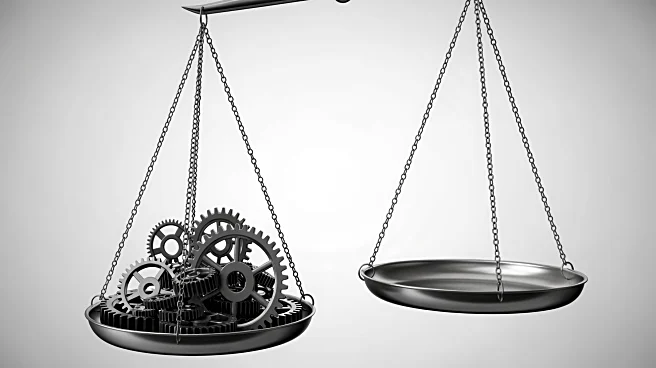What's Happening?
The Supreme Court is set to hear a significant case concerning President Trump's tariffs, which have been a central part of his economic strategy. These tariffs, imposed on imports from countries like China, Mexico, and Canada, are being challenged by
small businesses, including a family-owned toymaker and a wine importer. Despite the potential impact on the economy, major U.S. companies have remained silent, possibly due to fear of retribution from the White House. The tariffs, enacted under the International Emergency Economic Powers Act, have been used by President Trump to negotiate trade deals with major partners. The administration argues that these tariffs are essential for addressing trade imbalances and other declared emergencies.
Why It's Important?
The outcome of this case could have far-reaching implications for U.S. trade policy and the economy. If the Supreme Court rules against the tariffs, it could unravel trade agreements worth trillions of dollars, affecting relationships with key trading partners. Small businesses argue that the tariffs have increased costs and uncertainty, while the administration warns of catastrophic economic consequences if the tariffs are overturned. The lack of involvement from major companies suggests a strategic decision to avoid potential backlash from the administration, highlighting the complex interplay between business interests and government policy.
What's Next?
The Supreme Court's decision will be closely watched, as it could redefine the scope of presidential power in trade matters. If the court sides with the plaintiffs, it may lead to a reevaluation of the use of emergency powers in economic policy. Businesses and trade partners will be keenly interested in the outcome, as it could influence future trade negotiations and economic strategies. The case also raises questions about the role of large corporations in legal battles that affect their interests, particularly in politically sensitive contexts.
Beyond the Headlines
This case underscores the tension between small businesses and larger corporations in navigating government policies. It also highlights the potential risks companies face when opposing government actions, especially under an administration known for its willingness to retaliate against critics. The decision could set a precedent for how emergency powers are interpreted in economic contexts, potentially influencing future administrations' approaches to trade and economic policy.
















